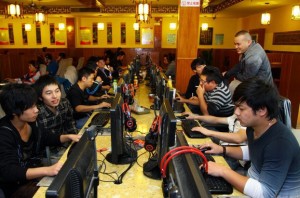2015-04-29
 Netizens at an Internet cafe in China’s Zhejiang province, Nov. 2, 2012.
Netizens at an Internet cafe in China’s Zhejiang province, Nov. 2, 2012.
AFP
Tough new regulations requiring online publishers to attend “chats” with officials and police if they post content deemed false or inappropriate have raised questions about the increasingly strong-armed role of China’s Internet regulator.
China’s Cyberspace Administration on Tuesday issued the rules, which set out a serious of violations of rules on web content that could prompt a summons to “drink tea,” a technique traditionally employed by the state security police to warn, interrogate, and intimidate rights activists and dissidents.
Sites deemed to have published banned content—which might include “false information, pornography, and rumors”—will be obliged to send a representative to such meetings from June 1, the official Xinhua news agency reported.
On Sept. 1, 2013, China’s highest judicial authorities issued a directive criminalizing online “rumor-mongering” in a move widely seen as targeting critical comments and negative news on the country’s hugely popular social media sites.
Until this year, the authorities have mostly targeted individuals under the new rules. But the Cyberspace Administration summoned high-ranking executives from Internet giants Sina and Netease for “tea” in February and April, “to urge them to correct their violations,” Xinhua said.
“There is a high possibility that those websites spreading rumors and pornography, leaking user information, and permitting users to set up illegal account names, will be invited for a chat,” official media quoted Cyberspace Administration official Fan Li as saying.
“If problems are not rectified after they have been summoned several times, [Internet portals] will be given heavier punishment,” Fan warned.
‘Strengthening, correcting’
According to Fan, the new system will strengthen “guidance and correction of errors,” rather than relying on a simple punishment system alone.
Sites that violate guidelines on content, whether by editing, posting, re-posting,or deleting news copy, including news organizations that either publish or do not publish certain items in return for cash, can expect a summons under the new regime.
According to the English-language China Daily newspaper, “‘Providing tea’ is a mild way of saying that cyber administrations at all levels will arrange meetings with Internet companies that have seriously violated the law and regulations, issue a warning and urge the adjustment of content.”
Government-initiated “chats” will become a regular management tool in managing Internet news service providers, who will be required to take action on the basis of what is said in them, the paper said.
Online content providers cannot decline the “invitation,” it said, adding that at least two clearly identified law enforcement officers would be required to attend each session and make a record of the “chat.”
